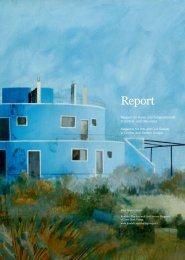Report_Issue 1/2009 - Jubiläum/ 20 Jahre Mauerfall
Report_Issue 1/2009 - Jubiläum/ 20 Jahre Mauerfall
Report_Issue 1/2009 - Jubiläum/ 20 Jahre Mauerfall
Sie wollen auch ein ePaper? Erhöhen Sie die Reichweite Ihrer Titel.
YUMPU macht aus Druck-PDFs automatisch weboptimierte ePaper, die Google liebt.
Migration researcher Michael Jandl investigates a sensitive topic: migration and illegal employment.<br />
In this interview with "<strong>Report</strong>" he explains why the option to restrict for a certain transitional<br />
period the free movement of labour as regards workers from the new EU countries (an<br />
option that was availed of by Austria) was only partly successful, and he indicates the form a<br />
sensible migration policy might take in the future.<br />
— Barbara Tóth talks to Michael Jandl —<br />
Barbara Tóth: In the study, partly financed by<br />
the Austrian science fund FWF, you focus primarily<br />
on current developments in the labour<br />
market. What are the initial results?<br />
Michael Jandl: Migration and working in the<br />
black economy in Austria cannot be directly<br />
equated with illegal migration. Illegal residency<br />
status can be a component but does not have to<br />
be. A prime example is the case of nurses from<br />
Slovakia and the Czech Republic who, since 1<br />
May <strong>20</strong>04, are EU citizens and are legally allowed<br />
to stay in Austria, but not to work here.<br />
Things are not as simple in the health care<br />
and nursing sector as depicted in the media.<br />
Recruitment takes place through organisations<br />
that claim to be organisations made up of<br />
members who pay contributions, and this is a<br />
grey area.<br />
Are there comparable mechanisms in other<br />
sectors?<br />
We have examined illegal migration in a variety<br />
of areas. The most important one is certainly<br />
the building industry in which one must expand<br />
the term. It ranges from those who work in construction<br />
as a second job to private sector conversions<br />
in the blossoming suburbs of Vienna,<br />
where people are having swimming pools, arbours<br />
and the like built. Here the network and<br />
recruiting function more on an informal basis<br />
through acquaintances and friends and people<br />
they recommend.<br />
Don’t the people who come here from the<br />
neighbouring countries profit also? Otherwise<br />
they would not take on such hardships.<br />
Of course the wage differences offer incentives<br />
to migration. However, – according to previous<br />
research experience and the results of migrant<br />
interviews – it is mostly not the under-qualified<br />
unemployed who are mobile, but other groups,<br />
mostly mobile, young, moderately to highly<br />
qualified people who see no prospects at home<br />
and view migration as a temporary measure.<br />
They all want to go home again. But whether<br />
this will happen is uncertain … generally returning<br />
home is an illusion.<br />
For the so-called “Gastarbeiter” (literally “guest<br />
workers”) of the seventies in many cases it remained<br />
an illusion. Can one compare the migrants<br />
back then with those from the new<br />
neighbouring countries?<br />
I don't think one can compare them directly.<br />
Back then foreign workers were recruited for<br />
certain specific branches of industry in Austria.<br />
We have had a recruitment freeze since 1974.<br />
There also are quite important differences between<br />
the migrants. The new migrants are, to<br />
some extent, more proactive, better educated<br />
and are not primarily brought in for lower<br />
qualified jobs. Whether the classic fate of the<br />
“Gastarbeiter” awaits them, remains to be seen.<br />
However, we shouldn’t forget that many foreign<br />
workers from those times returned home.<br />
Only some have remained. But those who<br />
stayed brought their families to join them. This<br />
represented an important decision to remain in<br />
Austria. The point is this: if children grow up<br />
here, it is extremely unlikely that the families<br />
will return to their native country.<br />
Is there any evidence that migrants from the<br />
new EU countries are beginning to bring their<br />
family members here?<br />
To everyone's surprise migration since the expansion<br />
of the EU is surprisingly low – above<br />
all in comparison to migration from the traditional<br />
migration countries. People from former<br />
Yugoslavia and Turkey still make up two thirds<br />
of the migrants living in Austria and of those<br />
who migrate to Austria. Despite the opening<br />
up of the East, the number of people coming<br />
from the new member states of Poland, Hungary,<br />
Slovakia and the Czech Republic has been<br />
minimal.<br />
Austria shares many common historical and<br />
cultural traditions with its more immediate<br />
neighbours. Wouldn’t increased cooperation in<br />
migration politics make more sense?<br />
Our neighbouring countries do not look exclusively<br />
to Austria. We have missed a number of<br />
opportunities here. They look rather to Brussels<br />
or across the Atlantic. Nor is immigration<br />
such a major topic in the new member countries.<br />
The proportion of immigrants is one to<br />
two per cent of the population. Emigration is<br />
a more important topic there. This is also reflected<br />
in institutions. The issue is not just the<br />
Brain Drain, but the positive contributions emigrants<br />
make to their native country – primarily<br />
in the form of money that they send home. At<br />
the same time, people are learning very quickly.<br />
Several new member countries already have a<br />
more modern migration policy than Austria.<br />
The Czech Republic, for example, has developed<br />
pilot projects to attract highly qualified<br />
people to the country.<br />
In <strong>20</strong>05 there were 175 to <strong>20</strong>0 million migrants worldwide.<br />
56 million immigrants live in Europe.<br />
Michael Jandl, is a migration researcher at the International<br />
Centre for Migration Policy Development (ICMPD),<br />
an international organisation with its headquarters in<br />
Vienna.<br />
www.icmpd.org<br />
Barbara Tóth is a journalist and author in Vienna. She<br />
writes for the weekly newspaper “Falter” and the “Basler<br />
Zeitung” about Austrian politics and Central Europe<br />
The unabridged interview was published in “<strong>Report</strong>”<br />
online in October <strong>20</strong>06.<br />
75




